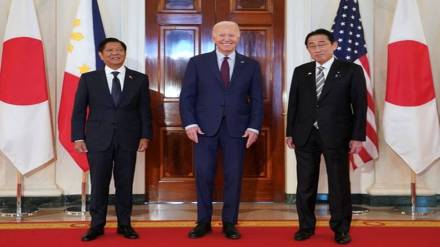The leaders from the US, Japan, and the Philippines gathered at the White House on Thursday for a meeting where they discussed how China is causing problems in the South China Sea. It was the first time that these three countries were having this kind of trilateral meeting.
Last month, there were several conflicts between the Philippines and China in the sea, involving water cannons and heated arguments. These disputes mainly focus on the Second Thomas Shoal, where Filipino troops have been stationed since 1999 to protect the area and claim it as Filipino territory.
US Support for Philippines
President Biden reaffirmed his commitment to defend the Philippines against any armed attacks in the South China Sea, based on a mutual defense treaty from the 1950s. This statement aims to clarify the U.S.’s stance on supporting the Philippines in the face of Chinese aggression.
International Legal Disputes
China claims a large part of the South China Sea, including areas within the Philippines’ exclusive economic zone. However, a ruling from the Permanent Court of Arbitration in 2016 rejected China’s claims, stating they lacked a legal basis.
Regional Cooperation and Assistance
The U.S. plans to conduct joint patrols with the Coast Guard in the Indo-Pacific region and provide humanitarian relief to the Philippines. Additionally, more joint patrols involving the U.S., Australia, the Philippines, and Japan are expected in the South China Sea.
In a bipartisan effort, U.S. senators introduced a bill to provide $2.5 billion in defense assistance to the Philippines to counter Chinese pressure. This demonstrates that the Philippines has support from allies amid tensions with China. Aside from security concerns, the leaders will also discuss broader regional challenges and economic development. New investments are expected in various sectors, including undersea cables, logistics, clean energy, and telecommunications.
Infrastructure and Investment Projects
Biden’s Partnership for global infrastructure and investment will support a new Luzon corridor project in the Philippines, focusing on infrastructure development such as ports, rail, clean energy, and semiconductor supply chains.
